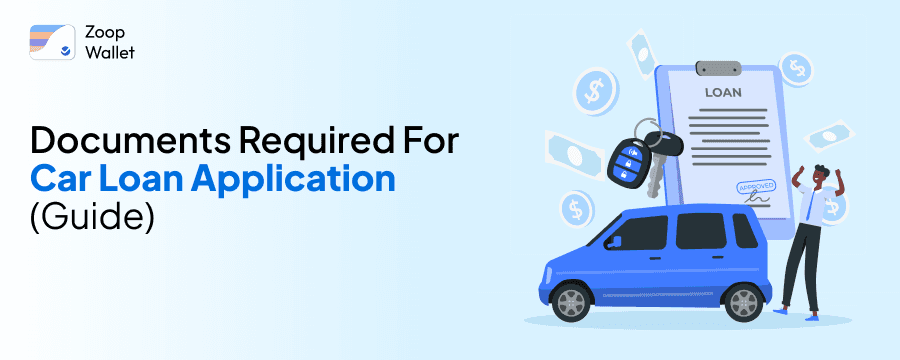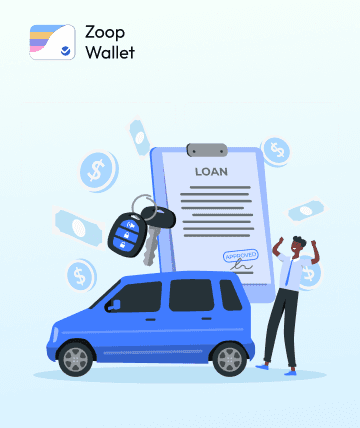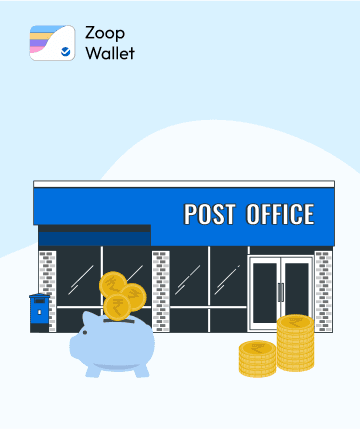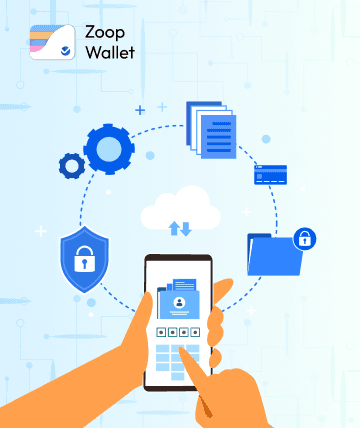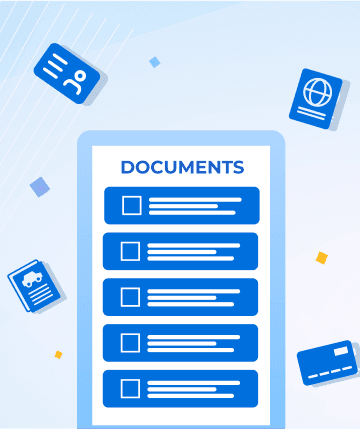Vehicle
Dec 26, 2024
Documents Required For Car Loan Application (Guide)
Geetika Panwar
Content Writer
When it comes to buying a car, securing a car loan is often a crucial step. While the process might seem daunting, understanding the required documents and eligibility criteria can make it smoother and stress-free. In this article, we’ll dive into car loan requirements, and highlight the key documents needed.
Car loans are financial tools that allow individuals to purchase vehicles without paying the entire amount upfront. With flexible repayment terms, they cater to both salaried and self-employed individuals.
Importance of Understanding the Documentation Process
The documentation process is not just a procedural step; it plays a pivotal role in determining the success of your car loan application. Here’s why it’s crucial to get it right:
1. Faster Loan Approval
Properly prepared documents speed up the evaluation process. Lenders rely on these documents to assess your eligibility, income stability, and creditworthiness. When all the required paperwork is in order, lenders can process your application faster, reducing waiting times and enabling quicker access to the funds you need.
Imagine submitting incomplete or unclear documents—this could lead to unnecessary back-and-forth communications, delays, and frustration. A well-prepared application shows lenders that you are organized and serious, streamlining the path to approval.
Digital solutions like ZoopSign can simplify this step by enabling you to electronically sign and submit documents in real-time. This eliminates delays caused by physical paperwork and ensures faster lender verification.
2. Avoiding Rejections Due to Incomplete or Incorrect Submissions
Many car loan applications are rejected not because the applicant lacks eligibility but due to missing or incorrect information in the documents provided. This could include:
Mismatched names on identity proof.
Outdated address proof.
Incorrect or incomplete bank statements.
Such issues not only prolong the process but can also result in outright rejection, forcing you to start over. Understanding the documentation process ensures you gather and present accurate and up-to-date documents, minimizing the risk of errors and ensuring your application proceeds without hiccups.
3. Ensuring a Smooth Application Experience for All Parties
A seamless documentation process benefits both the applicant and the lender. For you, it means less stress, fewer delays, and a clearer understanding of what is required. For lenders, it means efficient processing and faster decision-making.
When the documentation is complete and accurate:
The lender can quickly verify your identity, income, and creditworthiness.
There’s no need for follow-ups or additional clarifications.
The entire process becomes more transparent and efficient.
This smooth experience saves time and effort, enabling you to focus on other important aspects of purchasing your car. It also builds trust with your lender, setting the tone for a positive financial relationship.
Car Loan Criteria: Eligibility
Car loans are tailored to cater to different types of applicants, ensuring flexibility for both salaried individuals and self-employed professionals. Below is a detailed breakdown of car loan eligibility criteria based on employment type and income requirements, ensuring a smooth application process for all.
1. Eligibility for Salaried Individuals
This category includes employees working in both the private and public sectors, encompassing central, state, and local government bodies.
Key Requirements:
Age Limit: Applicants must be between 21 and 60 years, ensuring the loan tenure ends before the age of 60.
Employment Stability: A minimum of 2 years of work experience, with at least 1 year at the current organization, is required.
Income Threshold: A minimum annual income of ₹3,00,000 is necessary. Applicants can also include the income of a spouse or co-applicant to meet this requirement.
Communication Access: Having an active telephone or a post-paid mobile connection is mandatory.
This makes car loans accessible to salaried professionals with stable employment and consistent income.
2. Eligibility for Self-Employed Individuals and Professionals (Sole Proprietorship)
Self-employed individuals running their own businesses in manufacturing, trading, or services can also apply for car loans.
Key Requirements:
Age Limit: Applicants must be between 21 and 65 years, with the loan tenure concluding before the age of 65.
Business Continuity: The business must be operational for at least 2 years.
Annual Income: A minimum income of ₹3,00,000 per annum is required to qualify.
This ensures that sole proprietors with established businesses can benefit from tailored financial assistance.
3. Eligibility for Self-Employed Individuals and Professionals (Partnership Firms)
Partners involved in businesses such as manufacturing, trading, or services are also eligible to apply.
Key Requirements:
Annual Turnover: The partnership firm must generate a minimum turnover of ₹3,00,000 annually.
Professional Stability: The partnership should have a proven track record of consistent business operations.
This criterion accommodates businesses managed collectively by two or more partners.
4. Eligibility for Self-Employed Individuals and Professionals (Private Limited Companies)
Owners of private limited companies in the manufacturing, trading, or services sectors are eligible.
Key Requirements:
Annual Income: A minimum annual earning of ₹3,00,000 is required.
This allows business owners to secure financing based on their company’s financial stability.
5. Eligibility for Self-Employed Individuals (Public Limited Companies)
Directors of public limited companies can also apply for a car loan.
Key Requirements:
Annual Income: Directors must earn at least ₹3,00,000 per annum from their roles.
This makes financial aid accessible to individuals managing large-scale companies.
Here is the Summary of Key Criteria: Car Loan
CategoryAge LimitIncome/TurnoverAdditional RequirementsSalaried Individuals21-60 years₹3,00,000 annuallyStable employment, active phone connectionSole Proprietorship21-65 years₹3,00,000 annually2+ years of business operationsPartnership FirmsN/A₹3,00,000 turnoverPartnership in manufacturing, trading, or service businessPrivate Limited CompaniesN/A₹3,00,000 annuallyOwnership of a private companyPublic Limited CompaniesN/A₹3,00,000 annuallyRole as a director in a public company
Essential Documents Required for Car Loans:
Having the necessary documents in place is crucial for a hassle-free car loan application. Here’s a clear, structured guide based on the type of applicant, outlining the required documents for salaried and self-employed individuals.
For Salaried Individuals
Identity & Address Proof (Any one of the following):
Valid Passport
Permanent Driving License (recent, legible, laminated)
Voter ID Card
Job Card issued by NREGA
Letter issued by the National Population Register (containing details of name and address)
Aadhaar Card (submitted voluntarily with Aadhaar consent letter; the first 8 digits of the Aadhaar number should be redacted). Acceptable forms include:
Physical Aadhaar Card
Printout of e-Aadhaar (not older than 30 days from the date of application)
Income Proof:
Latest salary slip
Form 16
Bank Statement:
Previous 6 months' bank statement
For Self-Employed Individuals (Sole Proprietorship)
Identity & Address Proof (Any one of the following):
Valid Passport
Permanent Driving License (recent, legible, laminated)
Voter ID Card
Job Card issued by NREGA
Letter issued by the National Population Register (containing details of name and address)
Income Proof:
Latest Income Tax Return (ITR)
Bank Statement:
Previous 6 months' bank statement
For Self-Employed Individuals (Partnership Firms)
Income Proof (All of the following):
Audited Balance Sheet (last 2 years)
Profit & Loss Account (last 2 years)
Company ITR (last 2 years)
Address Proof (Any one of the following):
Telephone Bill
Electricity Bill
Shop & Establishment Act Certificate
SSI Registered Certificate
Sales Tax Certificate
Bank Statement:
Previous 6 months' bank statement
For Self-Employed Individuals (Private Limited Companies)
Income Proof (All of the following):
Audited Balance Sheet (last 2 years)
Profit & Loss Account (last 2 years)
Company ITR (last 2 years)
Address Proof (Any one of the following):
Telephone Bill
Electricity Bill
Shop & Establishment Act Certificate
SSI Registered Certificate
Sales Tax Certificate
Bank Statement:
Previous 6 months' bank statement
For Self-Employed Individuals (Public Limited Companies)
Income Proof (All of the following):
Audited Balance Sheet (last 2 years)
Profit & Loss Account (last 2 years)
Address Proof (Any one of the following):
Telephone Bill
Electricity Bill
Shop & Establishment Act Certificate
SSI Registered Certificate
Sales Tax Certificate
Bank Statement:
Previous 6 months' bank statement
Factors Affecting Car Loan Eligibility
Understanding the factors that influence car loan eligibility criteria can help you prepare better and increase the likelihood of approval. Here are the key elements:
1. Income and Employment Status
Lenders evaluate your repayment capacity based on your income. For salaried individuals, steady employment with a minimum income threshold is crucial. Self-employed applicants need consistent business income validated by documents needed for car loans, such as income tax returns (ITRs) and bank statements.
2. Credit Score
A high credit score reflects financial stability and responsible credit behavior, significantly boosting your eligibility.
3. Age and Repayment Capacity
Loan eligibility is determined by age brackets (21-60 for salaried individuals; up to 65 for self-employed) to ensure the loan is repaid before retirement or business discontinuity.
4. Existing Liabilities
Outstanding loans or debts can affect your eligibility by reducing your disposable income.
5. KYC and Documentation
Lenders require accurate KYC documents for car loans and other proofs of identity, address, and income. Any discrepancies can delay or hinder approval.
6. Employment Type: Salaried vs. Self-Employed
For salaried individuals, stability and a steady income matter most. For self-employed applicants, lenders prioritize financial documents like audited balance sheets and tax returns.
How to Improve Car Loan Eligibility
Boosting your car loan eligibility criteria can ensure quicker approval and better terms. Here’s how:
1. Maintain a Strong Credit Score
Aim for a credit score of 750 or higher. Pay off outstanding debts and avoid defaults to build a positive credit history.
2. Organize Your Documents
Ensure you have all documents needed for car loans ready, including proof of identity, address, income, and KYC documents. Use digital document management solutions, like Zoop Wallet, to store and retrieve documents easily.
3. Use Electronic Signature Solutions
Speed up the process with services like ZoopSign for signing loan agreements electronically. It’s secure, compliant with digital lending norms, and reduces processing time.
4. Opt for a Co-Applicant
Including a co-applicant, such as a spouse, can increase your combined income, improving eligibility.
5. Reduce Existing Liabilities
Pay off smaller debts to free up your disposable income, making you a more attractive borrower.
6. Choose the Right Loan Tenure
Opting for a longer repayment tenure can lower your EMIs and improve your chances of approval.
7. Demonstrate Financial Stability
For self-employed applicants, provide strong financial records like audited balance sheets and ITRs to showcase steady business performance.
Understanding Loan Terms and Conditions
Before applying for a car loan, it's essential to understand the terms and conditions that govern the loan. Key factors such as interest rates, tenure, and EMI calculations play a significant role in determining the overall cost of the loan.
Key Loan Terms Explained:
Interest Rates
Fixed Interest Rate: The rate remains constant throughout the tenure, ensuring predictable EMIs.
Floating Interest Rate: The rate fluctuates based on market conditions, which could increase or decrease the EMI.
Impact: Higher interest rates increase the overall cost of the loan, while lower rates make the loan more affordable.
Loan Tenure
Short Tenure: Higher monthly EMIs but lower overall interest payments.
Long Tenure: Lower monthly EMIs but higher total interest costs.
Consideration: Choose a tenure that balances monthly affordability with minimal interest burden.
EMI (Equated Monthly Installment)
EMIs are calculated based on the loan amount, interest rate, and tenure using the formula:
EMI = P x R x (1+R) ^N / [(1+R) ^N-1]
In this formula, the variables are:
P: The principal amount of the loan
R: The rate of interest
N: The number of monthly installments
Impact: Higher loan amounts or interest rates will increase the EMI, impacting monthly cash flow.
Processing Fees and Charges
Additional costs like processing fees, prepayment penalties, or late payment fees affect the total loan cost.
Understanding these terms helps borrowers choose loan structures that align with their financial goals.
The Importance of Down Payments
The down payment is the initial amount paid upfront for the car, with the remaining amount financed through the loan. A well-planned down payment not only facilitates loan approval but also significantly reduces the overall loan cost.
Impact of Down Payments:
Loan Approval
A higher down payment reduces the loan amount, which in turn lowers the lender’s risk and improves the chances of approval.
Monthly EMIs
A larger down payment reduces the principal loan amount, leading to smaller EMIs and less financial strain.
Overall Loan Cost
With a lower loan amount, borrowers pay less interest over the tenure, reducing the total cost of the loan.
Strategies to Save for a Down Payment:
Set a Savings Goal: Determine the target amount and timeline to plan your savings effectively.
Cut Back on Non-Essential Expenses: Channel extra funds toward your savings.
Leverage Fixed Deposits or Recurring Deposits: Use financial instruments that offer returns on your savings.
Utilize Bonuses or Windfalls: Allocate additional income like bonuses, tax refunds, or gifts toward your down payment.
Digital Solutions for Car Loan Management
The car loan journey, from application to repayment, can be time-intensive and paper-heavy. However, with innovative digital tools like ZoopSign and Zoop Wallet, borrowers can streamline the process, enhance security, and manage their documents efficiently. Here’s how these solutions revolutionize car loan management:
1. ZoopSign: Simplifying Electronic Signatures
ZoopSign eliminates the hassle of physical paperwork by enabling borrowers to electronically sign car loan documents. This tool is compliant with digital lending guidelines, offering a secure and legally recognized way to finalize agreements.
Benefits of ZoopSign:
Faster Approvals: No delays due to document couriering or physical signatures—loans get processed and approved quicker through aadhaar based esign.
Enhanced Security: Advanced encryption ensures the integrity of signed documents, safeguarding sensitive data.
Convenience Anytime, Anywhere: Borrowers can sign agreements digitally, whether they’re at home, at work, or on the go.
By integrating ZoopSign into the car loan process, lenders and borrowers alike experience reduced timelines and greater efficiency.
2. Zoop Wallet: Organizing Documents Securely
Zoop Wallet offers a centralized digital repository for all your car loan-related documents, ensuring you never misplace critical paperwork.
Key Features of Zoop Wallet:
Centralized Storage: Keep all essential documents—KYC, income proofs, loan agreements, and EMI schedules—securely in one place.
Anytime Access: Borrowers can access their documents 24/7 via the app, removing the need for physical files.
Future-Ready: With Zoop Wallet, borrowers can reuse stored documents for future applications, refinancing, or other financial needs.
How Digital Tools Simplify the Loan Journey
Paperless Convenience: Digital solutions eliminate the need for physical documents, speeding up the process and reducing errors.
Improved Organization: All documents, from KYC documents for car loans to signed agreements, are securely stored and accessible in just a few clicks.
Compliance and Security: Tools like ZoopSign adhere to regulatory standards, ensuring that digital processes are as safe as traditional ones.
Seamless Integration: These tools are designed to work together—sign documents with ZoopSign and store them in Zoop Wallet for future use.

